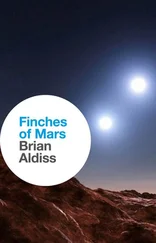Brian Aldiss - White Mars
Здесь есть возможность читать онлайн «Brian Aldiss - White Mars» весь текст электронной книги совершенно бесплатно (целиком полную версию без сокращений). В некоторых случаях можно слушать аудио, скачать через торрент в формате fb2 и присутствует краткое содержание. Год выпуска: 1999, ISBN: 1999, Издательство: Little, Brown UK, Жанр: Фантастика и фэнтези, на английском языке. Описание произведения, (предисловие) а так же отзывы посетителей доступны на портале библиотеки ЛибКат.
- Название:White Mars
- Автор:
- Издательство:Little, Brown UK
- Жанр:
- Год:1999
- ISBN:0-316-85243-0
- Рейтинг книги:5 / 5. Голосов: 1
-
Избранное:Добавить в избранное
- Отзывы:
-
Ваша оценка:
- 100
- 1
- 2
- 3
- 4
- 5
White Mars: краткое содержание, описание и аннотация
Предлагаем к чтению аннотацию, описание, краткое содержание или предисловие (зависит от того, что написал сам автор книги «White Mars»). Если вы не нашли необходимую информацию о книге — напишите в комментариях, мы постараемся отыскать её.
White Mars — читать онлайн бесплатно полную книгу (весь текст) целиком
Ниже представлен текст книги, разбитый по страницам. Система сохранения места последней прочитанной страницы, позволяет с удобством читать онлайн бесплатно книгу «White Mars», без необходимости каждый раз заново искать на чём Вы остановились. Поставьте закладку, и сможете в любой момент перейти на страницу, на которой закончили чтение.
Интервал:
Закладка:
“You will be aware of the M-gravitic anomaly associated with the Tharsis Shield. That anomaly is caused by a being so large it is visible even through terrestrial telescopes. We know it as Olympus Mons.
“Olympus Mons is not a geological object. Olympus Mons is a sentient being of unique kind.”
Immediately chaos erupted in the hall. Shouts of “It can’t be!” mingled with cries of “I told you so!” When calm was restored, Jimmy resumed, smiling rather a guilty smile, pleased by the shock he had engendered.
“My fellow scientists in this room will confirm what I say. This immense being, some seven hundred kilometres across, is a master of camouflage. Or else it’s a huge kind of barnacle. Its shell resembles the surrounding terrain, much as a chameleon takes on the colour of its background. Its time-sense must be very different from ours, since it has sat where it is now, without moving, for many centuries.
“Under its protective shell is organic life.”
He gave a nervous laugh.
“Terraforming would harm it. We are, ladies and gentlemen, sharing this planet with an amazingly large barnacle!”
The learned John Homer Bateson, leaning nearby against a pillar, hands in his robe, said, “An amazingly large barnacle! The mind is inclined to boggle somewhat. Well, well … Was it not Isocrates who called man the measure of all things? Such Ptolemaic thinking needs revision. Clearly it is this mollusc that is the measure of all things.”
Others present pressed forward with anxious questions.
Jimmy sought to give some reassurance.
“We can only speculate as to where the being came from, or where it might be going. Is it friend or enemy? We can’t tell as yet.”
“You mad scientists!” Crispin Barcunda was heard to exclaim. “What might this thing do if disturbed—if, say, we had started the terraforming process, with attendant atmospheric and chthonic upheavals?”
Jimmy spread his hands. “Olympus has its exteroceptors trained on us. All we can say is that it has, as yet, made no hostile move.”
Even the special performance of Mine? Theirs?, revised once again by Paula Gallin, was ill attended after this disconcerting news.
Speculation concerning Olympus, as it became known, continued on all levels. Much discussion concerned whether it might be regarded as malevolent or benevolent. Did this strange being consider that it owned Mars, in which case it might well regard humans as parasitic intruders? Or was it merely some unexpected variety of celestial jellyfish, without intention?
More alarm was caused when Jimmy Dust and his fellow scientists revealed that they had secured as a specimen one of the white tongues—had, in fact, hacked it off. Its complex cellular organisation had convinced them that, whatever Olympus was, it enjoyed sensory perception. Some reassurance was afforded by the fact that it had not retaliated against this attack on its exteroceptors. But perhaps it was merely biding its time.
I did not at this juncture realise how unwell I was. However, I had sufficient energy to call Dreiser Hawkwood on the Ambient. I demanded to know why the news that Olympus Mons was a living entity had been released to us in such a casual manner, by Jimmy Dust, the marathon winner. I asked if some kind of dangerous joke was being played on us. I raved on. I even said it had been firmly established that there was no life on Mars.
Dreiser listened patiently. He then said, “We chose to make the announcement as informally as possible, hoping not to alarm people. You will find the strategy is largely successful. People will cluck like hens and then get on with their day-to-day business. And you, Tom, I trust, will regain your customary good humour.”
It was the meek answer that increases wrath. “You told me when we spoke about Olympus that it was in no sense alive.”
“I never said that.”
“When we were preparing to address the assembly over a year ago, did you or did you not tell me there was no life on Mars?”
“No. I may have said we had found no life on Mars. Olympus was so big that it escaped our notice…” He chuckled. “I may have said we should expect Martian life to be very different from life Downstairs. So it proves.”
“You’re trying to tell me that this monstrous thing has just flopped out of the skies from space, or from another universe?”
“I might try to tell you many things, Tom, if you were fit to listen. I merely tell you this for now—that Olympus is entirely indigenous to Mars.”
When I asked how it was that he had made this discovery, rather late in our second year of isolation on Mars, Dreiser replied that a study of satellite photographs had convinced him there was some movement in the region.
“To whom did you first communicate this knowledge?”
He hesitated. “Tom, there are two things you should know. Firstly, we owe this perception—a perception I will admit I resisted at first—to the young genius you turned up, Kathi Skadmorr. What a clever young woman she is, what a quick brain!”
“Okay, Dreiser. And the second thing?”
“This object that Kathi insists on calling the ‘Watch-tower of the Universe’ is definitely on the move. And it’s moving in our direction, slow but sure. More news later. Goodbye.”
He signed off. I felt mortified that I had spoken so ill advisedly, and that the conversation had been recorded.
I went to lie down.
The physicists proposed sending an investigative expedition to Olympus. They were told to wait. Caution was to be the order of the day. Olympus might have a slower time sense than biological beings and could be planning a counterattack, so any close approach might imperil human lives.
I held private discussions with Jimmy Dust and his scientific colleagues, including the young man who maintained that cephalopods possessed intelligence.
“Human nature being what it is, the wish to believe in something bigger than themselves comes naturally to people,” one of the women said. “But we need to discourage the idea already circulating in some quarters that Olympus is a god. As far as our limited knowledge goes, it’s just a huge lump of rather inert organic material.”
“Yet we call it Olympus—traditionally the home of the gods.”
“That’s just a semantic quibble. Our guess is that this being is of low intelligence, being rupicolous.”
“Eh? What’s rupicolous?”
“Means it lives off rocks. Not a bright thing to do.”
“How so? At least there’s a generous supply of rock around right here…”
The discussion broke up without coming to any conclusion.
Adminex invited Hawkwood to come to the Hindenburg Hall and address an assembled crowd on the subject of Olympus. In particular we wished him to clarify its nature.
He agreed as long as his talk took the form of an interview. If I would ask the questions. I agreed. When we had both prepared for the talk, an assembly was called.
Since the occasion was so important, children were permitted to be present. In they streamed, carrying their tammies—tammies that had been fed and cosseted before their entry.
Dreiser arrived in style. He was prompt. He came with a retinue of four, the wispy Poulsen, another scientist, a blonde personal assistant whom we had met, as Cang Hai reminded me, in Dreiser’s office, and a fourth member whom I hardly recognised at first. Gone were her thick and curly chestnut locks. Her hair was now black, straight, and cut short. It was Kathi Skadmorr. When she shook my hand and smiled, I knew that smile.
The retinue settled themselves in the front seats, while Dreiser and I sat under the great photograph of the flaming zeppelin, in the dazzle of Suung Saybin’s lighting.
Dreiser began by saying that he wished to inform everyone of the little he knew concerning the nature of the life form called Olympus. He reminded us that Olympus had maintained its present existence for far longer than terrestrial telescopes had been around to be trained on Mars. It was an object, a life form, of immense antiquity, almost as ancient as the rocks to which it clung.
Читать дальшеИнтервал:
Закладка:
Похожие книги на «White Mars»
Представляем Вашему вниманию похожие книги на «White Mars» списком для выбора. Мы отобрали схожую по названию и смыслу литературу в надежде предоставить читателям больше вариантов отыскать новые, интересные, ещё непрочитанные произведения.
Обсуждение, отзывы о книге «White Mars» и просто собственные мнения читателей. Оставьте ваши комментарии, напишите, что Вы думаете о произведении, его смысле или главных героях. Укажите что конкретно понравилось, а что нет, и почему Вы так считаете.










